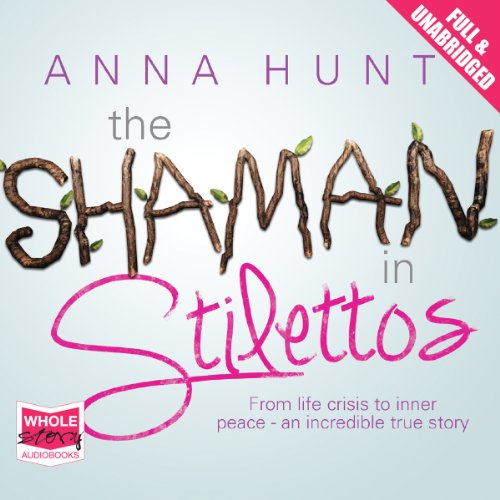In this week’s Audible Review, I will be discussing Anna Hunt’s novel, The Shaman in Stilettos, the true tale of how a modern woman falls for a charismatic shaman in Peru.
The Shaman in Stilettos
You have to give it to Anna Hunt – it’s a cracking title. In fact, I first heard about this book from a fellow attendee at a vocal shamanism course, who told me that she hadn’t read it but that she planned to, just because it was such a good title. Indeed, I’m sure that she was not alone and that many people who might otherwise have avoided a book about shamanism, have had their curiosity aroused enough by the title to risk purchasing the novel.
Certainly, the idea of a Daily Mail journalist, who loves fine dining and expensive clothes, becoming seduced by the simpler pleasures of the life of a shaman in Peru is an interesting journey to undertake. This book is undoubtedly at its best when it explores the story that it teases in its title but, all too often, it strays from what is a genuinely, intriguing premise.
Mills & Boon
The main problem with this book is what, paradoxically, might draw some people to read it in the first place – its Mills & Boon tone. Ultimately, you must make up your own mind on this score, but I found Anna Hunt’s account diminished by the drooling descriptions of her shaman, Maximo Morales, and his toned, glistening torso. The author is also not very well served in this aspect by her narrator – Antonia Beamish’s voice is pleasant enough but her attempts to bring Maximo to life with a seductive Peruvian accent are not like any accent that I have heard in Peru.
I could not find a photograph of Mr Morales, despite an extensive search online, so I cannot comment on whether he is God’s gift to humankind but I can tell you that, listening to the book, it was difficult to warm to someone who came across as so arrogant. No two medicine men are identical but he depiction of Mr Morales is pretty far removed from any of the Peruvian shamans that I have been fortunate enough to meet.
Bad Teacher
When Anna Hunt was finding her own path and stepping away from her superficial London life, her toxic boyfriend and her ghastly London companions, my interest picked up but I found myself consistently offended by her romantic musings. As a former teacher, I simply cannot approve of any teacher-pupil relationship because it represents such an awful breach of trust. This might seem a bit moralistic but, whatever Hunt’s complicity in their coupling, aren’t Morales’ actions an abuse of his power, authority and position as her teacher?
I was particularly disappointed to find so little in the way of life lessons in the book. Admittedly, this is more of a biography, than a manual on shamanism, but I felt that Anna Hunt needed to show us why she was so enamoured with the teachings that she, herself, found so life-changing. In addition, I appreciate that the experience of taking Ayahuasca can be difficult to describe for those that have not ingested it themselves but I would have liked a little more critical evaluation of her liberal use of plant medicine. Too often she comes across as little better than the plastic shamans or narco-tourists, of whom she paints unflattering portraits and of whom she seems to despise.
Conclusion
Shamanism has a wonderful capacity to change lives and help us find our true, authentic selves. I am delighted that Anna Hunt has had such a positive experience and that she chose to share her story with the world but I ought to have felt inspired or uplifted by her book and I’m afraid that, for a number of reasons, I was left feeling distinctly uneasy.


